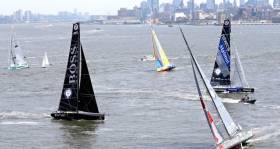Displaying items by tag: New York – Vendée
As boats head across the Atlantic in the New York – Vendée race it is not only potential Irish competitors in the Vendée Globe who are keeping a watchful eye on proceedings. Gordon Davies, an International Judge from Bray, is monitoring events carefully as a member of the International Jury.
The Jury has a particular role to play in these oceanic races. This is very much a professional sport, with the finance depending on the media impact of the event. The Jury acts as a guarantee that the principles of sportsmanship are respected. At the same time they contribute to ensuring that the race remains a spectacle that attracts the public’s attention.
So, for instance, protests are heard while boats are still at sea, carried out by e-mail. Penalties are taken at sea, whenever possible by sailing through a virtual gate and then re-sailing through the same gate the required number of hours later.
Boat on boat protests are rare, but can occur from time to time.
Essential, but little used, items of safety equipment are sealed in place on the boat, to avoid any temptation of ‘stacking’ (moving heavy items to the windward side of the boat). The drive shaft is also sealed. Measurement protests for broken seals were frequent, but there are fewer nowadays as competitors have learnt to secure heavy items. Penalties for accidentally broken seals are small, a matter of a few minutes, but there is a policy of not giving a zero penalty. Even a few minutes penalty can be important as close finishes on oceanic races are not unknown.
Another source of protests is for sailing within forbidden zones. Single and short-handed sailing are at best tolerated in many countries. All participants in the sport have a responsibility to ensure that maritime authorities are not given cause to complain. Sailing a large yacht single-handed through crowded shipping lanes is probably not the best way to avoid problems with commercial traffic. Increasingly, Traffic Separation Schemes are declared forbidden zones. In effect the playing field is moved away from the areas where commercial shipping is densest. Other forbidden zones may be set up to avoid ice or other dangers.
Competitors are tracked as they sail the race. Race Committee’s do not hesitate to protest a boat that enters a forbidden zone. As a result there may be protest from the Race Committee. Penalties for breaking this rule may seem harsh, but race organisers must demonstrate clearly to maritime authorities that they are determined that professional sport will not interfere with commercial traffic.
The work of the International Jury is important in these events. Unfortunately, perhaps, in the age of modern telecommunications, the work is carried out from home. Only one or, possibly, two, judges will travel to the race venue. The others work from home (or wherever they happen to be) via computer, laptop or smartphone.
Judging oceanic races is becoming a specialised discipline. There are complex rules for equipment and safety. Ireland if fortunate in having two International Race Officials who are regularly involved as race officials- Bill O’Hara (Volvo Ocean Race, Transat Bakerly…) and Gordon Davies (New York Vendée, Transat Bakerly, Transat Jacques Vabre, Route du Rhum)





























































